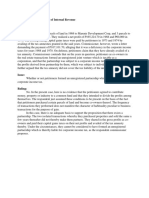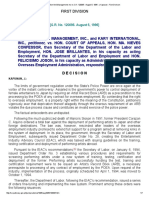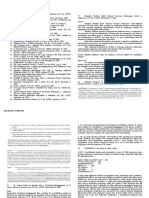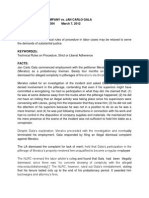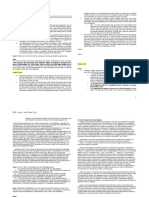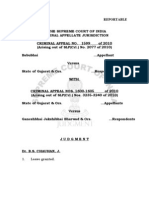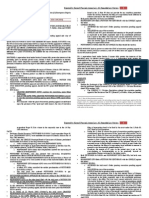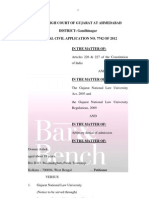0 ratings0% found this document useful (0 votes)
198 viewsPAL V NLRC (1988)
PAL V NLRC (1988)
Uploaded by
Patricia GonzagaCase Digest for Philippine Airlines v. NLRC (March 20, 1988)
Specific Issue(s): Definition of Labor Dispute, Injunctive Relief
Art. 212 of the Labor Code
Copyright:
© All Rights Reserved
Available Formats
Download as DOCX, PDF, TXT or read online from Scribd
PAL V NLRC (1988)
PAL V NLRC (1988)
Uploaded by
Patricia Gonzaga0 ratings0% found this document useful (0 votes)
198 views2 pagesCase Digest for Philippine Airlines v. NLRC (March 20, 1988)
Specific Issue(s): Definition of Labor Dispute, Injunctive Relief
Art. 212 of the Labor Code
Original Title
PAL v NLRC (1988)
Copyright
© © All Rights Reserved
Available Formats
DOCX, PDF, TXT or read online from Scribd
Share this document
Did you find this document useful?
Is this content inappropriate?
Case Digest for Philippine Airlines v. NLRC (March 20, 1988)
Specific Issue(s): Definition of Labor Dispute, Injunctive Relief
Art. 212 of the Labor Code
Copyright:
© All Rights Reserved
Available Formats
Download as DOCX, PDF, TXT or read online from Scribd
Download as docx, pdf, or txt
0 ratings0% found this document useful (0 votes)
198 views2 pagesPAL V NLRC (1988)
PAL V NLRC (1988)
Uploaded by
Patricia GonzagaCase Digest for Philippine Airlines v. NLRC (March 20, 1988)
Specific Issue(s): Definition of Labor Dispute, Injunctive Relief
Art. 212 of the Labor Code
Copyright:
© All Rights Reserved
Available Formats
Download as DOCX, PDF, TXT or read online from Scribd
Download as docx, pdf, or txt
You are on page 1of 2
PHILIPPINE AIRLINES, INC., vs.
, NATIONAL LABOR RELATIONS COMMISSION,
FERDINAND PINEDA and GODOFREDO CABLING
G.R. No. 120567 March 20, 1998
MARTINEZ, J.
DOCTRINE:
The term "labor dispute" is defined as "any controversy or matter concerning terms and
conditions of employment or the association or representation of persons in
negotiating, fixing, maintaining, changing, or arranging the terms and conditions of
employment regardless of whether or not the disputants stand in the proximate relation
of employers and employees."
KEYWORDS:
Labor Dispute, Injunction, Flight Stewards, Currency Smuggling
FACTS:
Private respondents are flight stewards of the petitioner. Both were dismissed from the
service for their alleged involvement in currency smuggling in Hong Kong.
Aggrieved by said dismissal, private respondents filed with the NLRC a petition for
injunction praying that a temporary restraining order be issued, prohibiting PAL from
effecting or enforcing the Decision dated Feb. 22, 1995, or to reinstate petitioners
temporarily while a hearing on the propriety of the issuance of a writ of preliminary
injunction is being undertaken.
The NLRC issued a temporary mandatory injunction.
PAL moved for reconsideration arguing that the NLRC erred in granting a temporary
injunction order when it has no jurisdiction to issue an injunction or restraining order
since this may be issued only under Article 218 of the Labor Code if the case involves
or arises from labor disputes.
ISSUE:
Is there a labor dispute between the petitioners and private respondent to entitle the
latter to injunctive relief?
RULING:
NONE. In labor cases, Article 218 of the Labor Code empowers the NLRC to enjoin or
restrain any actual or threatened commission of any or all prohibited or unlawful acts or
to require the performance of a particular act in any labor dispute which, if not restrained
or performed forthwith, may cause grave or irreparable damage to any party or render
ineffectual any decision in favor of such party; x x x."
The foregoing ancillary power may be exercised by the Labor Arbiters only as an
incident to the cases pending before them in order to preserve the rights of the
parties during the pendency of the case, but excluding labor disputes involving strikes or
lockout.
From the foregoing provisions of law, the power of the NLRC to issue an injunctive writ
originates from "any labor dispute" upon application by a party thereof, which
application if not granted "may cause grave or irreparable damage to any party or
render ineffectual any decision in favor of such party."
The term "labor dispute" is defined as "any controversy or matter concerning terms and
conditions of employment or the association or representation of persons in
negotiating, fixing, maintaining, changing, or arranging the terms and conditions of
employment regardless of whether or not the disputants stand in the proximate relation
of employers and employees."
The term "controversy" is likewise defined as "a litigated question; adversary proceeding
in a court of law; a civil action or suit, either at law or in equity; a justiciable dispute."
A "justiciable controversy" is "one involving an active antagonistic assertion of a legal
right on one side and a denial thereof on the other concerning a real, and not a mere
theoretical question or issue."
Taking into account the foregoing definitions, it is an essential requirement that there
must first be a labor dispute between the contending parties before the labor arbiter. In
the present case, there is no labor dispute between the petitioner and private
respondents as there has yet been no complaint for illegal dismissal filed with the labor
arbiter by the private respondents against the petitioner.
You might also like
- Complaint For Damages SampleDocument4 pagesComplaint For Damages SampleJubelee Anne Patangan100% (3)
- Letter of RequestDocument1 pageLetter of RequestPatricia GonzagaNo ratings yet
- Cruz V Valero and Luzon Sugar CompanyDocument2 pagesCruz V Valero and Luzon Sugar CompanyPatricia Gonzaga0% (1)
- Fali Nariman - Silences in Indian Constitutional LawDocument16 pagesFali Nariman - Silences in Indian Constitutional LawbhmanaviNo ratings yet
- 5) SHS Perforated v. DiazDocument2 pages5) SHS Perforated v. DiazRaymund CallejaNo ratings yet
- 5 - Case DigestDocument29 pages5 - Case DigestJoshua RiveraNo ratings yet
- Casualty Insurance Fortune Insurance and Surety Co., Inc. vs. CADocument2 pagesCasualty Insurance Fortune Insurance and Surety Co., Inc. vs. CACarl GuevaraNo ratings yet
- Emilio Tan V CaDocument3 pagesEmilio Tan V Cayukibambam_28No ratings yet
- Rule 36-38 PDFDocument10 pagesRule 36-38 PDFSittie Norhanie Hamdag LaoNo ratings yet
- Geluz V CADocument1 pageGeluz V CAAnthony Arcilla PulhinNo ratings yet
- 05 Toyota Motors Phils Corp WA V Toyota MotorsDocument4 pages05 Toyota Motors Phils Corp WA V Toyota MotorsArtemisTzyNo ratings yet
- Labor Relations ReviewerDocument58 pagesLabor Relations ReviewerBenedict Jonathan BermudezNo ratings yet
- Ilaw at Buklod NG Manggagawa Vs NLRCDocument1 pageIlaw at Buklod NG Manggagawa Vs NLRCVerity WillowsNo ratings yet
- Ramiscal JR Vs Hon. Sandiganbayan - People Vs CaloDocument8 pagesRamiscal JR Vs Hon. Sandiganbayan - People Vs CaloRonnieEnggingNo ratings yet
- Raniel Vs JochicoDocument1 pageRaniel Vs JochicoJocelyn Yemyem Mantilla VelosoNo ratings yet
- Case 25 - Insular Life Vs NLRCDocument1 pageCase 25 - Insular Life Vs NLRCClaire CaceresNo ratings yet
- Ikaw at Buklod NG Manggagawa vs. NLRCDocument4 pagesIkaw at Buklod NG Manggagawa vs. NLRCKrizzia GojarNo ratings yet
- Pascual Vs Cir DigestDocument1 pagePascual Vs Cir Digesterlaine_francisco100% (1)
- Mesina vs. IAC DigestDocument2 pagesMesina vs. IAC DigestAr LineNo ratings yet
- Labor Serrano Vs GallantDocument1 pageLabor Serrano Vs GallantCamille GrandeNo ratings yet
- 2017 Pre-Bar Lecture: (1:27) First Off, The Migrant Worker's ActDocument21 pages2017 Pre-Bar Lecture: (1:27) First Off, The Migrant Worker's ActArvin CruzNo ratings yet
- Luzon Stevedoring v. PSCDocument2 pagesLuzon Stevedoring v. PSCd2015memberNo ratings yet
- Coporation Case DigestDocument72 pagesCoporation Case DigestSharonRosanaElaNo ratings yet
- CIR v. AlgueDocument1 pageCIR v. Alguefay garneth buscatoNo ratings yet
- Case Digest Labor CodeDocument5 pagesCase Digest Labor CodePhi SalvadorNo ratings yet
- Apex Mining Vs NLRCDocument1 pageApex Mining Vs NLRCida_chua8023100% (1)
- Bernate Vs CADocument2 pagesBernate Vs CAJSNo ratings yet
- Labor Relations CasesDocument3 pagesLabor Relations Casesivory_beadsNo ratings yet
- CASE 1: Grepalife V CADocument2 pagesCASE 1: Grepalife V CAJoahna GoyagoyNo ratings yet
- Civil Law Aliviado vs. Procter and Gamble G.R. No. 160506 June 6, 2011 SUBJECTS: Obligations and Contract FactsDocument2 pagesCivil Law Aliviado vs. Procter and Gamble G.R. No. 160506 June 6, 2011 SUBJECTS: Obligations and Contract FactsWeddanever CornelNo ratings yet
- Docslide - Us - 32 Santos Vs Servier PDFDocument3 pagesDocslide - Us - 32 Santos Vs Servier PDFJanineNo ratings yet
- 27 Austria Vs ReyesDocument2 pages27 Austria Vs ReyesKGTorresNo ratings yet
- SS Ventures Intl v. SS Ventures Labor UnionDocument1 pageSS Ventures Intl v. SS Ventures Labor UnionEvielyn MateoNo ratings yet
- Labor Law Digests - Atty. Magsino's Class.Document21 pagesLabor Law Digests - Atty. Magsino's Class.Ansfav PontigaNo ratings yet
- Sterling Products Intl Inc V SolDocument1 pageSterling Products Intl Inc V SolRaya Alvarez TestonNo ratings yet
- 3G1718 LABREL Golangco Case DoctrinesDocument76 pages3G1718 LABREL Golangco Case DoctrinesKirstie Marie SaldoNo ratings yet
- Florendo Vs Philam PlansDocument3 pagesFlorendo Vs Philam PlansEmi CagampangNo ratings yet
- DIGEST Standards 2Document26 pagesDIGEST Standards 2Gian Paula MonghitNo ratings yet
- Pascual v. de La Cruz, 28 SCRA 421Document2 pagesPascual v. de La Cruz, 28 SCRA 421marco bugayongNo ratings yet
- National Sugar Refineries v. NLRCDocument4 pagesNational Sugar Refineries v. NLRCGia DimayugaNo ratings yet
- Moran JR Vs CADocument1 pageMoran JR Vs CAracrabe96No ratings yet
- Goldenberg CaseDocument3 pagesGoldenberg CaseFriendship GoalNo ratings yet
- 6 - People v. Sison - CauilanDocument2 pages6 - People v. Sison - Cauilanrommel alimagnoNo ratings yet
- Philippine Pharmahealth Inc. V PfizerDocument2 pagesPhilippine Pharmahealth Inc. V PfizerJeanella Pimentel CarasNo ratings yet
- Enriquez Vs Sun LifeDocument1 pageEnriquez Vs Sun LifeERNIL L BAWA100% (1)
- Philippine National Bank v. Hydro Resources Contractors Corporation G.R. No. 167530, March 13, 2013Document4 pagesPhilippine National Bank v. Hydro Resources Contractors Corporation G.R. No. 167530, March 13, 2013PCpl Harvin jay TolentinoNo ratings yet
- Santiago V CF Sharp DigestDocument1 pageSantiago V CF Sharp DigestAemie JordanNo ratings yet
- Case Digest 2Document38 pagesCase Digest 2Clarise Satentes Aquino100% (1)
- Aldrine Ilustricimo VS Nyk Fil Sjip Management IncDocument11 pagesAldrine Ilustricimo VS Nyk Fil Sjip Management Inckristel jane caldozaNo ratings yet
- Arce Vs Capital InsuranceDocument2 pagesArce Vs Capital InsuranceHency TanbengcoNo ratings yet
- Corp Cases NewestDocument13 pagesCorp Cases NewestfuckvinaahhhNo ratings yet
- St. Luke's Medical Center, Inc. v. Sanchez, G.R. No. 212054, (March 11, 2015)Document10 pagesSt. Luke's Medical Center, Inc. v. Sanchez, G.R. No. 212054, (March 11, 2015)Anonymous jUM6bMUuRNo ratings yet
- Peopler vs. Quidato JR - EvidenceDocument5 pagesPeopler vs. Quidato JR - EvidenceJNo ratings yet
- Canezo - vs. - Rojas - Docx Filename - UTF-8''Canezo vs. RojasDocument3 pagesCanezo - vs. - Rojas - Docx Filename - UTF-8''Canezo vs. RojasAnonymous mv3Y0KgNo ratings yet
- Cuajao Vs Chua Lo Tan LaborDocument2 pagesCuajao Vs Chua Lo Tan LaborEllen Tumbaga0% (1)
- Palacol V CallejaDocument2 pagesPalacol V CallejaAmbra Kaye AriolaNo ratings yet
- Usita Digests Labrel (Part 3Document9 pagesUsita Digests Labrel (Part 3Viceni AlbaNo ratings yet
- Del Monte Corp vs. CADocument16 pagesDel Monte Corp vs. CAolga silangNo ratings yet
- JMM Promotion and Management, Inc Vs CA - 120095 - August 5, 1996 - J Kapunan - First DivisionDocument7 pagesJMM Promotion and Management, Inc Vs CA - 120095 - August 5, 1996 - J Kapunan - First DivisionReal TaberneroNo ratings yet
- San Miguel Brewery Sales Force UnionDocument1 pageSan Miguel Brewery Sales Force Unionhello_hoarderNo ratings yet
- FACTS: in Accordance W/ The Will Executed by The Decedent EdwardDocument4 pagesFACTS: in Accordance W/ The Will Executed by The Decedent EdwardDon Ycay100% (1)
- MODULE 5 CasesDocument13 pagesMODULE 5 CasesJoyceNo ratings yet
- PAL v. NLRC, March 20, 1998Document2 pagesPAL v. NLRC, March 20, 1998Heart NuqueNo ratings yet
- Cases 218, 221Document109 pagesCases 218, 221Ariel Mark PilotinNo ratings yet
- Gonzales Vs MarmaineDocument3 pagesGonzales Vs MarmainePatricia GonzagaNo ratings yet
- Tiu V CADocument4 pagesTiu V CAPatricia GonzagaNo ratings yet
- St. Stephen's Association V CIRDocument3 pagesSt. Stephen's Association V CIRPatricia GonzagaNo ratings yet
- Reyes V AlmanzorDocument3 pagesReyes V AlmanzorPatricia GonzagaNo ratings yet
- Letter of Request 2Document1 pageLetter of Request 2Patricia GonzagaNo ratings yet
- Villanueva V City of IloiloDocument3 pagesVillanueva V City of IloiloPatricia Gonzaga100% (1)
- Pepsi-Cola V City of ButuanDocument3 pagesPepsi-Cola V City of ButuanPatricia Gonzaga100% (1)
- Meralco V GalaDocument2 pagesMeralco V GalaPatricia GonzagaNo ratings yet
- Lutz v. AranetaDocument3 pagesLutz v. AranetaPatricia GonzagaNo ratings yet
- Smith Kline V CA (2003)Document8 pagesSmith Kline V CA (2003)Patricia GonzagaNo ratings yet
- Employees Union of Bayer Phils. V Bayer Phils. Inc., Et Al.Document4 pagesEmployees Union of Bayer Phils. V Bayer Phils. Inc., Et Al.Patricia GonzagaNo ratings yet
- Samson Jr. V TarrozaDocument2 pagesSamson Jr. V TarrozaPatricia GonzagaNo ratings yet
- Smith Kline V CA (2001)Document7 pagesSmith Kline V CA (2001)Patricia GonzagaNo ratings yet
- Statcon SyllabusDocument7 pagesStatcon SyllabusPatricia GonzagaNo ratings yet
- 02 Maguan V CADocument6 pages02 Maguan V CAJun NunezNo ratings yet
- SPL - Atty. Axel Cruz (2A)Document9 pagesSPL - Atty. Axel Cruz (2A)kookNo ratings yet
- Understanding Sources Tax Law Fact SheetDocument6 pagesUnderstanding Sources Tax Law Fact SheetJane Layug CabacunganNo ratings yet
- Labor Compiled CasesDocument33 pagesLabor Compiled Casesirish kitongNo ratings yet
- MENAKA V LUM KUM CHUM - (1977) 1 MLJ 91 PDFDocument8 pagesMENAKA V LUM KUM CHUM - (1977) 1 MLJ 91 PDFzatikhairuddinNo ratings yet
- Republic V Cansino 5 SCRA 103Document3 pagesRepublic V Cansino 5 SCRA 103Marifel LagareNo ratings yet
- Further Investigation Under Section 173 (8) CRPC - Supreme Court Case 2010Document37 pagesFurther Investigation Under Section 173 (8) CRPC - Supreme Court Case 2010Sridhara babu. N - ಶ್ರೀಧರ ಬಾಬು. ಎನ್No ratings yet
- Facts: Petitioner Metrobank Is A Domestic Banking Corporation Duly Organized and Existing Under TheDocument3 pagesFacts: Petitioner Metrobank Is A Domestic Banking Corporation Duly Organized and Existing Under TheNathan TamayoNo ratings yet
- Searches and SeizuresDocument379 pagesSearches and SeizuresApureelRoseNo ratings yet
- Stat Dec BasicDocument3 pagesStat Dec BasicMarkNo ratings yet
- Comey Memos: CNN V FBI - Motion/Memo To Amend Court Opinion and Order DE 87-1Document7 pagesComey Memos: CNN V FBI - Motion/Memo To Amend Court Opinion and Order DE 87-1Techno Fog100% (3)
- Affdavit For Temporary Injunction ArumugamDocument4 pagesAffdavit For Temporary Injunction ArumugamfredrickNo ratings yet
- Aglibot V SantiaDocument13 pagesAglibot V SantiaSong OngNo ratings yet
- Choi v. North Bear Beauty SystemsDocument6 pagesChoi v. North Bear Beauty SystemsPriorSmartNo ratings yet
- Navarosa Vs COMELECDocument4 pagesNavarosa Vs COMELECKaren PascalNo ratings yet
- How To Argue A CaseDocument5 pagesHow To Argue A CaseItam HillNo ratings yet
- Malaga Vs Penachos: DecisionDocument5 pagesMalaga Vs Penachos: DecisionPao InfanteNo ratings yet
- Timberlane Case FullDocument21 pagesTimberlane Case FullDiane Cabral CalangiNo ratings yet
- PDFDocument1 pagePDFChristopher PierceNo ratings yet
- CauseListFile X2V8GQ933KU PDFDocument8 pagesCauseListFile X2V8GQ933KU PDFsandeepNo ratings yet
- Wlse & Co., Inc. vs. Dionisio P. TanglaoDocument1 pageWlse & Co., Inc. vs. Dionisio P. TanglaoKaye Miranda LaurenteNo ratings yet
- Exemption of COURT FEE in MVOP - 13-Atchukatla AnjammaDocument4 pagesExemption of COURT FEE in MVOP - 13-Atchukatla AnjammaVemula Venkata Pavankumar100% (2)
- Roberts Vs CADocument19 pagesRoberts Vs CAMyra MyraNo ratings yet
- ADR Act of 2004Document12 pagesADR Act of 2004des_0212No ratings yet
- Frederick H. Quarles v. Hugh O. Miller Lawrence W. Burks, 86 F.3d 55, 4th Cir. (1996)Document7 pagesFrederick H. Quarles v. Hugh O. Miller Lawrence W. Burks, 86 F.3d 55, 4th Cir. (1996)Scribd Government DocsNo ratings yet
- Writ Petition Filed Before Gujarat High CourtDocument117 pagesWrit Petition Filed Before Gujarat High Courtraghul_sudheesh67% (3)
- Corruption and Anti-Corruption Issues in AfghanistanDocument48 pagesCorruption and Anti-Corruption Issues in AfghanistanRobin Kirkpatrick BarnettNo ratings yet
- AP Residential and Non Residential Tenancy ActDocument18 pagesAP Residential and Non Residential Tenancy ActGeethesh JaddaNo ratings yet
- 01 Unraveling The Tangled Web of Realauction OwnershipDocument86 pages01 Unraveling The Tangled Web of Realauction OwnershipConflictsCheckNo ratings yet

















